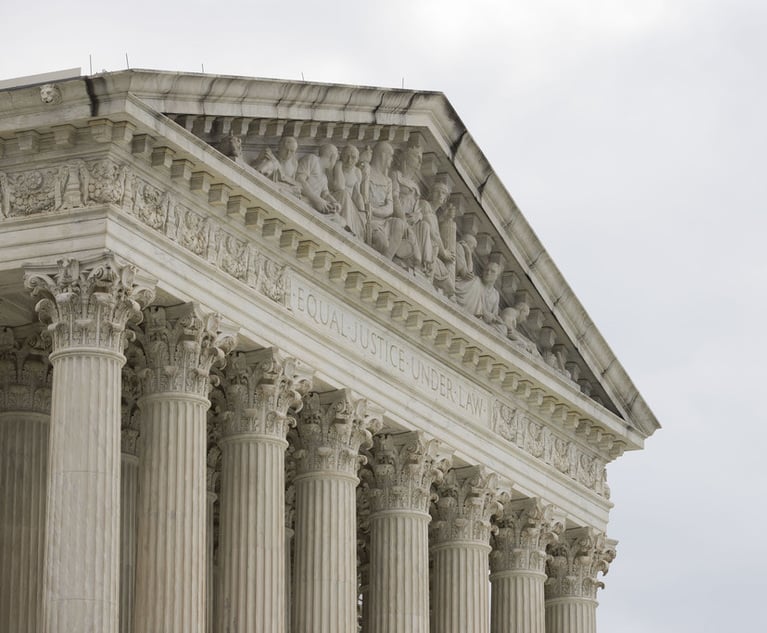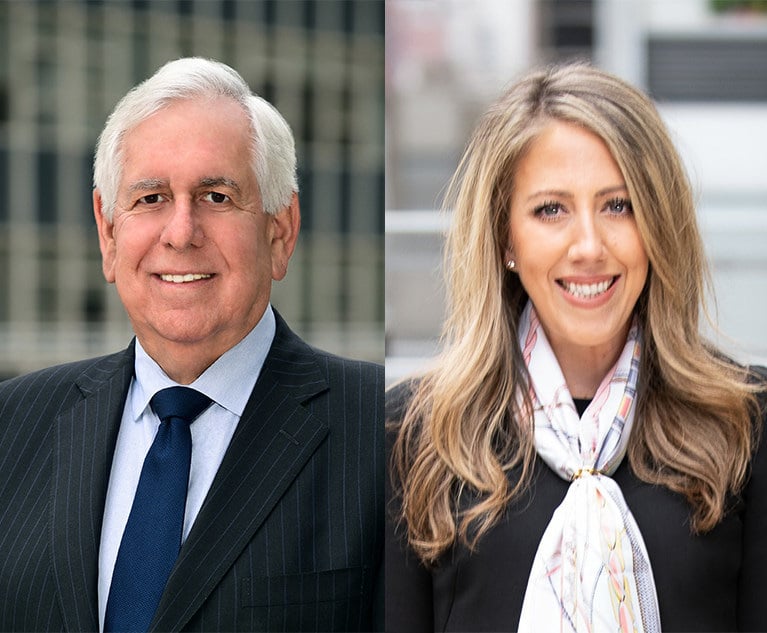Drawing Fifth Amendment Adverse Inferences Against Corporate Defendants
Jed I. Bergman and Cynthia M. Jordano summarize the key principles courts generally apply in deciding whether to permit Fifth Amendment adverse inferences in civil suits against corporate defendants. To support drawing such adverse inferences, a plaintiff must satisfy three prerequisites. First, there must be independent evidence corroborating the inference. Second, the plaintiff must persuade the court to impute that inference to the corporate defendant. Third, the probative value of the inference must outweigh any unfair prejudice.
August 03, 2017 at 02:03 PM
21 minute read
Almost a century ago, Justice Louis Brandeis recognized that “[s]ilence is often evidence of the most persuasive character.” Bilokumsky v. Tod, 263 U.S. 149, 153 (1923). In civil litigation that overlaps with potential criminal conduct, that observation carries great weight: An individual's decision to remain silent by invoking her Fifth Amendment rights can be used as evidence against her. Cases against corporate defendants present an added wrinkle, because the privilege is typically asserted by a co-defendant or non-party, such as a current or former employee. The plaintiff may wish to use that invocation of Fifth Amendment rights to prove liability by drawing adverse inferences against the company, while the corporate defendant will naturally want to avoid any negative consequences of its agent's attempt to avoid criminal jeopardy.
Precisely this issue is being litigated right now in the Waymo v. Uber case, pending in the Northern District of California. In that case, the theft of trade secrets claim asserted by Google affiliate Waymo rests in part on 14,000 electronic files that Anthony Levandowski—a former Google employee subsequently hired by Uber—allegedly improperly downloaded before leaving Google. Levandowski took the Fifth at his deposition, and was then fired by Uber for his failure to testify. The parties actively dispute whether and to what extent those assertions should give rise to adverse inferences against Uber at the upcoming October 2017 trial.
Though the Waymo court has not yet ruled, this article summarizes the key principles courts generally apply in deciding whether to permit Fifth Amendment adverse inferences in civil suits against corporate defendants. To support drawing such adverse inferences, a plaintiff must satisfy three prerequisites. First, there must be independent evidence corroborating the inference. Second, the plaintiff must persuade the court to impute that inference to the corporate defendant. Third, the probative value of the inference must outweigh any unfair prejudice.
Corroboration
In Baxter v. Palmigiano, 425 U.S. 308, 320 (1976), the Supreme Court ruled that adverse inferences from a party's refusal to testify in civil litigation must be corroborated by independent supporting evidence. Subsequent case law has clarified that the corroboration requirement applies at both summary judgment and at trial, and can also be addressed by a motion in limine. Though courts have not established a clear-cut test for how much corroboration is required, the evidentiary threshold for corroborating evidence should logically be lower than the ultimate standard of proof. Otherwise, the inference itself would carry no weight, and would not really be evidence at all.
This content has been archived. It is available through our partners, LexisNexis® and Bloomberg Law.
To view this content, please continue to their sites.
Not a Lexis Subscriber?
Subscribe Now
Not a Bloomberg Law Subscriber?
Subscribe Now
NOT FOR REPRINT
© 2024 ALM Global, LLC, All Rights Reserved. Request academic re-use from www.copyright.com. All other uses, submit a request to [email protected]. For more information visit Asset & Logo Licensing.
You Might Like
View All
For Safer Traffic Stops, Replace Paper Documents With ‘Contactless’ Tech
4 minute read
Impact of New NYS Workers’ Compensation Work-Related Stress Relief on Discrimination Claims

Justices Will Weigh Constitutionality of Law Allowing Terror Victims to Sue PLO

Are New York City Housing Providers Ready for the Fair Chance for Housing Act?
10 minute readTrending Stories
- 1The Key Moves in the Reshuffling German Legal Market as 2025 Dawns
- 2Social Media Celebrities Clash in $100M Lawsuit
- 3Federal Judge Sets 2026 Admiralty Bench Trial in Baltimore Bridge Collapse Litigation
- 4Trump Media Accuses Purchaser Rep of Extortion, Harassment After Merger
- 5Judge Slashes $2M in Punitive Damages in Sober-Living Harassment Case
Who Got The Work
Michael G. Bongiorno, Andrew Scott Dulberg and Elizabeth E. Driscoll from Wilmer Cutler Pickering Hale and Dorr have stepped in to represent Symbotic Inc., an A.I.-enabled technology platform that focuses on increasing supply chain efficiency, and other defendants in a pending shareholder derivative lawsuit. The case, filed Oct. 2 in Massachusetts District Court by the Brown Law Firm on behalf of Stephen Austen, accuses certain officers and directors of misleading investors in regard to Symbotic's potential for margin growth by failing to disclose that the company was not equipped to timely deploy its systems or manage expenses through project delays. The case, assigned to U.S. District Judge Nathaniel M. Gorton, is 1:24-cv-12522, Austen v. Cohen et al.
Who Got The Work
Edmund Polubinski and Marie Killmond of Davis Polk & Wardwell have entered appearances for data platform software development company MongoDB and other defendants in a pending shareholder derivative lawsuit. The action, filed Oct. 7 in New York Southern District Court by the Brown Law Firm, accuses the company's directors and/or officers of falsely expressing confidence in the company’s restructuring of its sales incentive plan and downplaying the severity of decreases in its upfront commitments. The case is 1:24-cv-07594, Roy v. Ittycheria et al.
Who Got The Work
Amy O. Bruchs and Kurt F. Ellison of Michael Best & Friedrich have entered appearances for Epic Systems Corp. in a pending employment discrimination lawsuit. The suit was filed Sept. 7 in Wisconsin Western District Court by Levine Eisberner LLC and Siri & Glimstad on behalf of a project manager who claims that he was wrongfully terminated after applying for a religious exemption to the defendant's COVID-19 vaccine mandate. The case, assigned to U.S. Magistrate Judge Anita Marie Boor, is 3:24-cv-00630, Secker, Nathan v. Epic Systems Corporation.
Who Got The Work
David X. Sullivan, Thomas J. Finn and Gregory A. Hall from McCarter & English have entered appearances for Sunrun Installation Services in a pending civil rights lawsuit. The complaint was filed Sept. 4 in Connecticut District Court by attorney Robert M. Berke on behalf of former employee George Edward Steins, who was arrested and charged with employing an unregistered home improvement salesperson. The complaint alleges that had Sunrun informed the Connecticut Department of Consumer Protection that the plaintiff's employment had ended in 2017 and that he no longer held Sunrun's home improvement contractor license, he would not have been hit with charges, which were dismissed in May 2024. The case, assigned to U.S. District Judge Jeffrey A. Meyer, is 3:24-cv-01423, Steins v. Sunrun, Inc. et al.
Who Got The Work
Greenberg Traurig shareholder Joshua L. Raskin has entered an appearance for boohoo.com UK Ltd. in a pending patent infringement lawsuit. The suit, filed Sept. 3 in Texas Eastern District Court by Rozier Hardt McDonough on behalf of Alto Dynamics, asserts five patents related to an online shopping platform. The case, assigned to U.S. District Judge Rodney Gilstrap, is 2:24-cv-00719, Alto Dynamics, LLC v. boohoo.com UK Limited.
Featured Firms
Law Offices of Gary Martin Hays & Associates, P.C.
(470) 294-1674
Law Offices of Mark E. Salomone
(857) 444-6468
Smith & Hassler
(713) 739-1250






